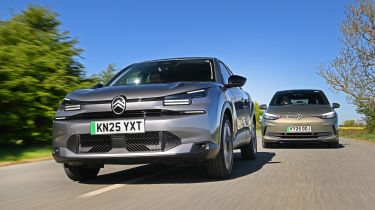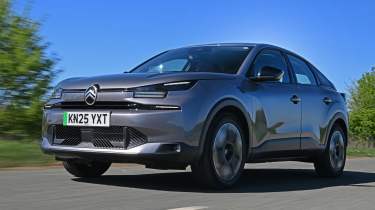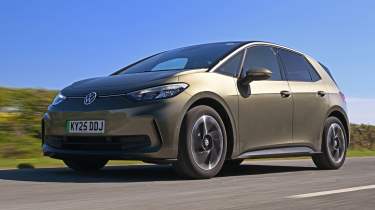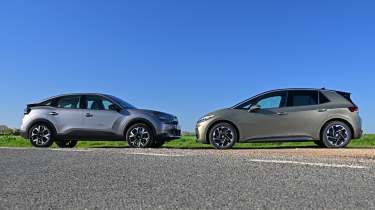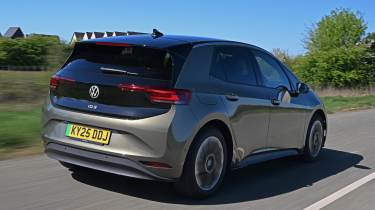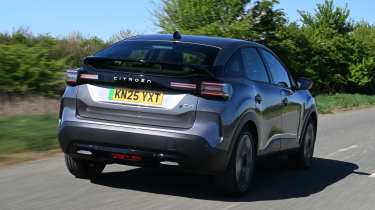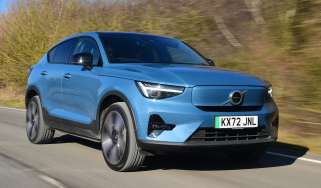Citroen e-C4 vs Volkswagen ID.3: which affordable EV is best for the family?
Electric car prices are falling, as seen on the facelifted Citroen e-C4 and brand-new entry-level VW ID.3. But which is the better buy?
There’s a new buzzword in the world of electric vehicles – affordability. It seems that with each new model that’s launched, prices become cheaper, while those EVs that have been around for a bit longer have seen a steady fall in their prices over time.
Take the Citroen e-C4 as an example. This electric crossover hatchback has been on the market since 2020, and during its time on sale it has gone through a number of revisions to keep it competitive. Most recently, the e-C4 benefited from a facelift to incorporate Citroen’s latest family look, but the French firm also took the opportunity to knock around £4,000 off its list price, too.
Volkswagen is another company that has constantly tinkered with its model line-up, and the ID.3 hatchback has been updated with the arrival of a new entry-level variant. Called Essential, it does exactly what it says by offering the smallest battery and lowest power output in the range, but still has enough kit to make it an attractive option.
So which model makes the best case for itself? Does the e-C4 offer great value? Or does the ID.3 deliver enough to justify its price tag?
Citroen e-C4
| Model: | Citroen e-C4 50kWh Plus |
| Price: | £27,650 |
| Powertrain: | 50kWh battery (50kWh usable), 1x e-motor, 134bhp |
| 0-62mph: | 10.0 seconds |
| Test efficiency: | 3.6 miles/kWh |
| Official range: | 219 miles |
| Annual VED: | £195 |
The Citroen e-C4 uses the same platform as cars such as the Peugeot 208 and Vauxhall Corsa superminis, but its dimensions are more like a compact hatchback’s. As with those models, it also comes with petrol and hybrid powertrains, but here we’re concentrating on the all-electric version.
Used - available now

2021 Land Rover
Range Rover
84,000 milesAutomaticPetrol3.0L
Cash £30,999
2022 BMW
3 Series
32,500 milesAutomaticPetrol2.0L
Cash £23,789
2024 Audi
A3 Sportback
3,188 milesAutomaticPetrol1.5L
Cash £25,000
2024 Porsche
Taycan
30,000 milesAutomaticElectric
Cash £39,950Prices start at £27,650, which is around £4,000 less than the pre-facelift model. This gets you a car with a 50kWh battery, while the top-spec Max model is the only one with the larger 54kWh pack.
Tester’s notes
The e-C4’s three drive modes are selected via a rocker switch next to the drive selector on the centre console, but as with other Stellantis models with this set-up, they seem a bit superfluous to me. The system defaults to Normal when you start the car, so you stick with that most of the time.
Eco mode cuts the power, so it feels as if you need to work harder to maintain the same speed. Power adds a snappy throttle response that requires you to adjust your driving style to compensate. It feels at odds with the car’s character.
One place where the e-C4’s roots as a combustion-engined vehicle are most obvious is beneath the boot carpet. Lift it up and you’ll find a circular recess for a spare wheel, but while the petrol C4 has a completely round indentation, the e-C4’s is squared off to make space for the battery.
Ironically, not even the petrol version of the C4 has the option of a spare wheel – you’ll just have to rely on the tyre pressure warning system and standard repair kit to keep you going if you suffer any damage.
Volkswagen ID.3
| Model: | Volkswagen ID.3 Essential |
| Price: | £30,860 |
| Powertrain: | 55kWh battery (52kWh usable), 1x e-motor, 168bhp |
| 0-62mph: | 8.2 seconds |
| Test efficiency: | 4.1 miles/kWh |
| Official range: | 241 miles |
| Annual VED: | £195 |
It’s been five years since the Volkswagen ID.3 kicked off the electrification of VW’s line-up, and since then it has been joined by a range of models that use largely the same running gear.
The ID.3 itself was given a facelift in 2023, while the Essential model tested here has helped lower the overall starting price of the line-up. At £30,860, it falls between the 50kWh and 54kWh versions of the e-C4 on price, while the battery is rated with a usable capacity of 52kWh, which VW says is enough for a range of 241 miles.
Tester’s notes
I think Match trim adds enough extra to the ID.3 to justify its mark-up over the Essential version. Alloy wheels look smarter than the plastic trims on the base spec, while the reversing camera, navigation and main beam assist are all useful features to have.
Another handy addition is the two-zone climate control. All ID.3s have two bars beneath the main display that you slide your finger across to adjust the temperature. On Essential cars they keep the dash symmetry intact, because they have the same function.
Adding options involves paying for some pricey packs instead of individual items. VW’s smart-looking head-up display comes with either the £1,175 Driver Assistance Pack or the Assistance Package Plus (£2,240), which also adds semi-autonomous driving tech that can change lanes. It also includes a memory function and a remote parking operation.
If you want improved driving dynamics, the £955 Sports package adds Volkswagen’s DCC Dynamic Chassis Control and progressive steering for sharper responses.
Head-to-head
On the road
As with other Citroens, the e-C4 is geared towards comfort over sporty handling. Grip is good and the electric powertrain is responsive to a point, but the soft ride encourages you to take things easy and revel in the cosseting feel. The ID.3’s rear-wheel-drive set-up and responsive electric motor sound like a recipe for fun, and it’s certainly more engaging than the Citroen, but the ride is fidgety at lower speeds.
Tech highlights
All versions of the e-C4 come with a 10-inch touchscreen. Plus and Max trims feature navigation and voice control, but all variants include wireless smartphone connectivity. The ID.3 also features this tech, while adaptive cruise control is included as standard too. Neither car comes with a heat pump as standard, but it’s a more affordable extra on the Citroen at £450; it costs £1,150 to add to the VW.
Price and running
There’s an overlap in prices between the highest-spec versions of the e-C4 and the entry point to the ID.3 line-up, but both models feature a similar amount of kit. The VW proved to be more efficient on test, with a return of 4.1 miles per kWh compared with 3.6mi/kWh for the Citroen. Combine this with the bigger battery, and the ID.3 can travel more than 210 miles between charges.
Practicality
The Citroen looks rakish next to the upright VW, but these two cars offer a similar amount of space inside. The ID.3 has more headroom and legroom, but both cars are equally wide, and boot space is pretty much comparable between them, too. The VW’s bay is longer and wider, but there’s a high load floor because of the rear-mounted electric motor that takes up space beneath the boot.
Charging
Volkswagen offers a faster DC charging rate than Citroen. A 10-80 per cent top-up can take as little as 25 minutes from a 145kW source, but the e-C4 maxes out at 100kW, and Citroen quotes a 20-80 per cent charge time of half an hour. If you can take advantage of 11kW three-phase charging, you’ll need to pay £300 to upgrade the e-C4 to use it – it’s a standard feature on the ID.3.
Ownership
Both models come with a three-year/60,000-mile warranty, while VW includes three years of roadside assistance to Citroen’s one. Servicing costs are very similar between these two models, with the annual price of Citroen’s £508 four-year package working out nearly the same as VW’s £384 three-year deal. Citroen was fifth out of 32 in the last Driver Power brands’ survey, well ahead of VW in 29th.
Verdict
Winner: Volkswagen ID.3
While the Volkswagen Golf set a benchmark in the compact hatch class, the Volkswagen ID.3 hasn’t quite had the same impact in the EV sector. Updates have improved the car, though, while the latest Pure-battery variant delivers good value for money while still offering a decent range.
We’d go as far to say that this model in Match trim is the sweet spot in the range. It offers all the kit you could possibly want at a price that makes higher-spec variants look expensive. The roomy cabin and decent driving manners help it to slot easily into family life.
Runner-up: Citroen e-C4
Picking between these two cars is difficult because they both have key strengths. There’s lots to like about the Citroen e-C4, especially its comfortable ride and plush seats, while the reduced list prices make it even more tempting.
As a family car, the C4 ticks the right boxes for space and practicality, while the choice of petrol, hybrid or EV powertrains means there should be a model for most buyers. As an EV, it’s a refined machine, but the range and slow charging capability mean it’s a little behind the curve when compared with the ID.3.
Prices and specs
| Citroen e-C4 | Volkswagen ID.3 | |
| Our choice | e-C4 50kWh Plus | ID.3 Pure Essential |
| Price from/price of our choice | £27,650/£29,310 | £30,860/£33,135 |
| Powertrain and performance | ||
| Powertrain | 1x electric motor | 1x electric motor |
| Power | 134bhp | 168bhp |
| Torque | 260Nm | 310Nm |
| Transmission | Single-speed auto/FWD | Single-speed auto/RWD |
| 0-62mph/top speed | 10.0 seconds/93mph | 8.2 seconds/99mph |
| Battery capacity/usable | 50/50kWh | 55/52kWh |
| Official range | 219 miles | 241 miles |
| Test efficiency/range | 3.6mi/kWh/180 miles | 4.1mi/kWh/213 miles |
| Charging | 100kW (20-80% in 30 mins) | 145kW (10-80% in 25 mins) |
| Dimensions | ||
| Length/wheelbase | 4,355/2,670mm | 4,264/2,770mm |
| Width/height | 1,800/1,520mm | 1,809/1,564mm |
| Rear kneeroom | 585-830mm | 637-869mm |
| Rear headroom/elbow room | 910/1,445mm | 956/1,444mm |
| Boot space (front/seats up/down) | 380/1,250 litres | 385/1,267 litres |
| Boot length/width | 800/1,005mm | 852/1,013mm |
| Boot lip height | 725mm | 774mm |
| Kerbweight/towing weight | 1,571/454kg | 1,712/548kg |
| Turning circle | 10.9 metres | 11.5 metres |
| Costs/ownership | ||
| Residual value (after 3yrs/36,000 miles) | £9,899/35.8% | £15,708/50.9% |
| Depreciation | £17,751 | £15,152 |
| Insurance group/quote/VED | 22/£757/£195 | 20/£601/£195 |
| Three-year service cost | £508 (4yrs) | £384 |
| Annual tax liability std/higher rate | £166/£331 | £185/£370 |
| Annual fuel cost (12,000 miles) | £832 | £732 |
| Basic warranty (miles)/recovery | 3yrs (60,000)/1yr | 3yrs (60,000)/3yrs |
| Driver Power manufacturer position | 5th | 29th |
| NCAP Adult/child/ped./assist/stars | 80/83/57/63/4(2021) | 87/89/71/88/5(2020) |
| Equipment | ||
| Metallic paint/wheel size | £595-£720/18 inches | £810-£965/18 inches |
| Parking sensors/camera | Rear/yes | Front & rear/no |
| Spare wheel/Isofix points | Repair kit/two | Repair kit/three |
| Keyless entry & go/powered tailgate | No/no | Yes/no |
| Leather/heated seats | No/no/£450 | No/no/£1,150 |
| Screen size/digital dashboard | 10.0 inches/yes | 12.9 inches/yes |
| Climate control/panoramic sunroof | Two-zone/no | Two-zone/£795 |
| USBs/wireless charging | Three/no/£400 | Four/no/yes |
| Wireless CarPlay/Android Auto | Yes/yes | Yes/yes |
| Blind-spot warning/head-up display | No/yes | No/no |
| Adaptive cruise/steering assist | No/yes | Yes/yes |
What we would choose
Citroen
Most extras are reserved for the top-spec Max model. This includes the Techno Pack, which adds 360-degree cameras, adaptive cruise control and a wireless phone charger for £500. A sunroof costs £790 on Max trim.
Volkswagen
As well as having more kit, the ID.3 has more options, too. Alloys (£1,310) can replace the standard wheel trims, there are trick LED lights (£1,725) and a tow hitch (£1,105), but this is just for mounting a cycle carrier.
Looking for your next car? You can now search our nationwide dealer network for a choice of great cars on offer right now with new, used and leasing deals to choose from...

